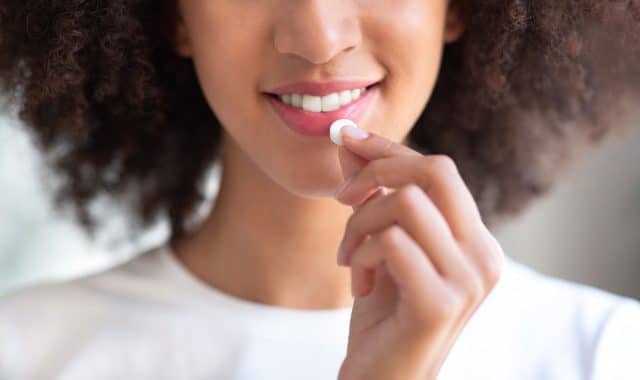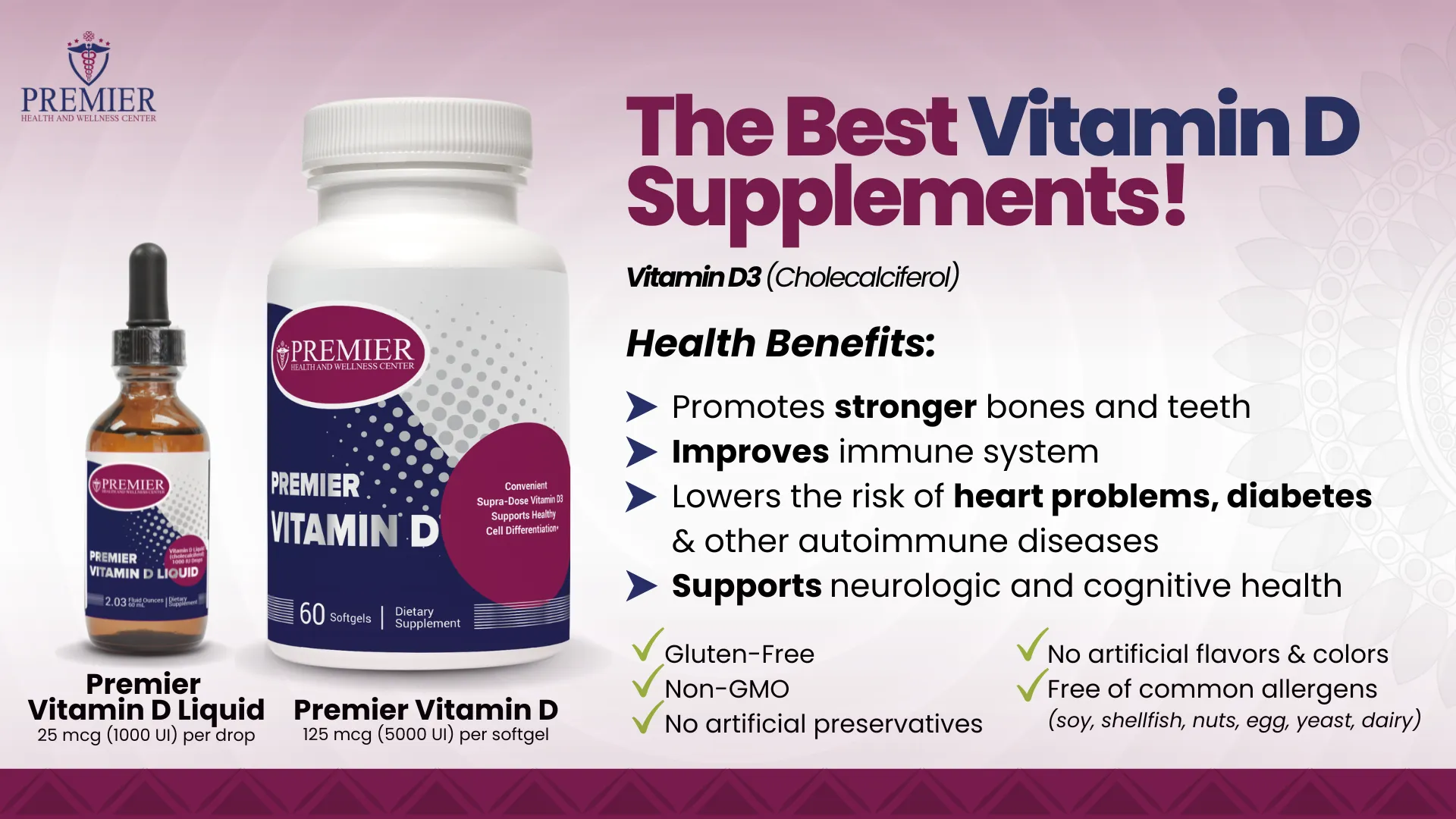
Are you struggling with low energy levels, weaker immunity, or a less-than-stellar mood?
Maybe you find yourself catching every cold and flu that goes around. All these symptoms may be signs of a lack of vitamin D. With our busy modern lifestyles, we are less likely than ever to get enough sunlight to meet our vitamin D needs.
The good news is that there’s a solution – vitamin D supplements. However, the quality of supplements is not the same, and choosing a high-quality product that provides the optimal amount of vitamin D is essential!
This blog will explore the importance of vitamin D, how to tell if you’re deficient, and how a premium-quality vitamin D supplement can help you achieve optimal health and well-being. Read on and find out what vitamin D can do for you!
What is Vitamin D
Vitamin D, or the sunshine vitamin, is a fat-soluble vitamin that your body naturally produces when the skin is exposed to sunlight. You can also find this nutrient in certain foods you can consume.
There are two types of vitamin D:
- Vitamin D2
Also known as ergocalciferol, you can get this vitamin D from plant sources, which your body can’t produce. It is common in fortified foods such as milk, cereal, and orange juice.
- Vitamin D3
The body naturally synthesizes Vitamin D3 or cholecalciferol when you expose your skin to UVB radiation from sunlight. Additionally, animal-based foods such as fatty fish, egg yolks, and cheese are good sources of Vitamin D3.
What Are the Best Benefits of Vitamin D on Our Health?
Optimal levels of vitamin D are necessary for maintaining good health and well-being. Let’s delve into the key advantages of maintaining adequate levels of this sunshine vitamin:
1.Strengthening Bone Health
Vitamin D regulates calcium and phosphorus levels in the body, essential minerals for building strong bones and teeth. It enhances calcium absorption in the gut, working hand in hand with calcium to fortify our skeletal system.
Without enough vitamin D, the body cannot effectively absorb calcium and phosphorus, weakening bones. As a result, the risk of fractures may increase, especially in the elderly. In children, a lack of vitamin D can cause rickets, a condition that causes weak and deformed bones.
2.Boosting Immune System Function
A well-functioning immune system is vital for warding off infections and diseases. Vitamin D boosts immune cells’ function, including T and B cells, which play a critical role in the immune system’s response to infections and diseases.
Additionally, Vitamin D helps to increase the production of antimicrobial proteins responsible for fighting bacteria, viruses, and other harmful pathogens. Moreover, multiple studies have demonstrated that it could potentially minimize the chance of autoimmune disorders like multiple sclerosis and rheumatoid arthritis.
3.Supporting Mental Health and Well-being
Vitamin D has a profound effect on mental health too. Studies show a connection between adequate vitamin D levels to mood improvement and a lower risk of depression. In addition, research also suggests that this nutrient could help manage symptoms of anxiety and other mood disorders.
One possible reason for this link is that vitamin D regulates neurotransmitters, such as serotonin, which are responsible for mood regulation. Vitamin D also helps decrease inflammation, a factor that increases the risk of depression and other mental health problems.
4.Promoting Heart Health
A healthy heart is the cornerstone of a healthy life. Vitamin D contributes to cardiovascular health by controlling blood pressure. It also regulates calcium and phosphate levels that help the heart muscle contract and relax correctly. Additionally, vitamin D has anti-inflammatory properties that reduce the risk of inflammation in the heart and blood vessels, which is a crucial factor in the development of atherosclerosis.
5.Aiding in Diabetes Prevention
Emerging evidence suggests that vitamin D may play a role in minimizing the risk of developing type 2 diabetes. It does so by regulating insulin sensitivity and promoting better glucose metabolism. Maintaining sufficient vitamin D levels can help keep blood sugar levels within a healthy range.
6.Reducing the Risk of Cancer
Chronic inflammation contributes to multiple types of cancer, and vitamin D may help mitigate this risk by reducing inflammation in the body.
Studies have shown that people with higher levels of vitamin D in their blood have a lower risk of developing colorectal cancer and that vitamin D supplementation may help to prevent the development of this type of cancer.
Moreover, vitamin D may reduce cancer risk by promoting healthy cell growth and division. Vitamin D helps to regulate gene expression that controls cell proliferation and differentiation, which may help to prevent the uncontrolled growth of cancer cells.
Signs of Vitamin D Deficiency
It is not uncommon to experience vitamin D deficiency, particularly in regions with limited sunlight or during the winter season when sunlight is scarce. If you suspect a vitamin D deficiency, you must talk to your doctor about getting tested.
Signs that you may be lacking in vitamin D include:
-
- Weakness and Fatigue
- Muscle and bone pain
- Depression
- Impaired wound healing
- Hair loss
Sources of Vitamin D
Getting enough vitamin D is critical for your health, and the sunlight is an excellent source of vitamin D3. However, the amount of vitamin D3 you produce when exposed to sunlight can vary depending on factors such as season, the time of day, location, and skin tone. The best time of day to get vitamin D from the sun is typically midday, between 10 a.m. and 2 p.m.
While vitamin D is vital for good health, too much sun exposure can lead to skin cancer. Therefore, it’s important to balance the benefits of vitamin D production with the need to protect your skin from harmful UV radiation.
If you reside in regions with insufficient sunlight or spend a lot of time indoors, it can be challenging to get enough vit. D from sunshine alone. You may need to supplement your diet with vitamin D in these cases.
Premier Vitamin D – The Best Vitamin D Supplement
Are you ready to elevate your health and well-being to new heights? We have just the solution for you. Discover the powerful benefits of Premier Vitamin D.

Unparalleled Quality
Premier Vitamin D pills are your ultimate source of cholecalciferol in a convenient soft gel form. Its liquid formula features vitamin D and sunflower oil, which we carefully blend using a unique micro-emulsification process.
This process creates a natural micellized matrix, ensuring optimal absorption and maximum benefits. We strive to provide only the best, which is why this supplement is also third-party tested for purity and potency.
The Perfect Dose
With a potent 5000 IU per serving, Premier Vitamin D is indeed sunshine in a bottle! These soft gels offer the ideal dosage to help you maintain optimal Vitamin D levels throughout the year. This strength has been carefully chosen to provide the most benefits without overloading your system, making it an ideal supplement for daily wellness.
Easy-to-Take Softgels
Premier Vitamin D soft gels come in convenient, easy-to-swallow capsules, making them a breeze to incorporate into your day. The non-GMO, allergen-free, and gluten-free formula means you can trust that you’re getting a clean, natural product that aligns with your health-conscious lifestyle.
Premier Vitamin D Liquid: A Versatile and Fast-Absorbing Option
Premier Vitamin D Liquid offers a highly bioavailable, flexible alternative for those who prefer a liquid form or have difficulty swallowing pills. Our liquid formula ensures rapid absorption into your system, delivering the vital nutrient directly to where it’s needed.
The easy-to-use dropper makes it simple to adjust the dosage to meet the individual needs of adults and seniors. With its neutral taste, it can be conveniently added to your favorite beverages, making it an effortless addition to your daily routine.
FAQs on Vitamin D
1.Can vitamin D be harmful?
Although vitamin D is crucial for overall health, excessive intake can result in toxicity. Symptoms of vitamin D toxicity may include vomiting, nausea, and weakness. The best practice is to consult a healthcare professional before consuming high levels of vitamin D.
2.Can you get too much Vitamin D from the sun?
The body can produce vitamin D when exposed to sunlight, but it’s difficult to get too much vitamin D from the sun alone. However, wearing sunscreen is important to protect against skin damage and skin cancer.
3.What is the recommended daily intake of Vitamin D?
The recommended daily vitamin D intake varies depending on age and other factors. Most adults’ recommended intake is 600-800 IU (International Units) daily. Supplements offering 1000 UI to 5,000 UI are safe and should help individuals achieve an adequate blood level of vitamin D.
To determine the proper vitamin D dosage that meets your specific needs, it is vital to consult with a healthcare provider.
4.What Vitamin D is best?
While both forms of vitamin D can help to raise blood levels of vitamin D, studies have shown that vitamin D3 is the best type of vitamin D. This type is more effective than vitamin D2 at increasing and maintaining vitamin D levels in the body.
Therefore, if you are looking to improve your vitamin D intake, To optimize your supplement regimen, experts often suggest selecting a product that contains vitamin D3.
Get Your Daily Dose of Vitamin D!
Don’t let low Vitamin D levels hold you back any longer. Boost your immune system, Reclaim your energy, and enhance your overall well-being. Adopting a multi-faceted approach that incorporates sunlight exposure, dietary sources, and vitamin D supplementation is crucial to optimize your vitamin D levels.
Visit us at our physical stores in Hamilton, Bermuda, or make an online purchase at www.premiernutraceuticals.com. Don’t hesitate to contact us if you need any additional information. Simply give us a call at 441-292-5111 or send an email to info@premierhealth.bm.
Disclaimer:The information provided on this blog is intended for educational and informational purposes only. It is not intended to be a substitute for professional medical advice, diagnosis, or treatment. Please consult with your healthcare provider before taking any supplement or making any changes to your diet or exercise routine. If you experience any adverse effects while taking a supplement, discontinue use immediately and seek medical attention.
